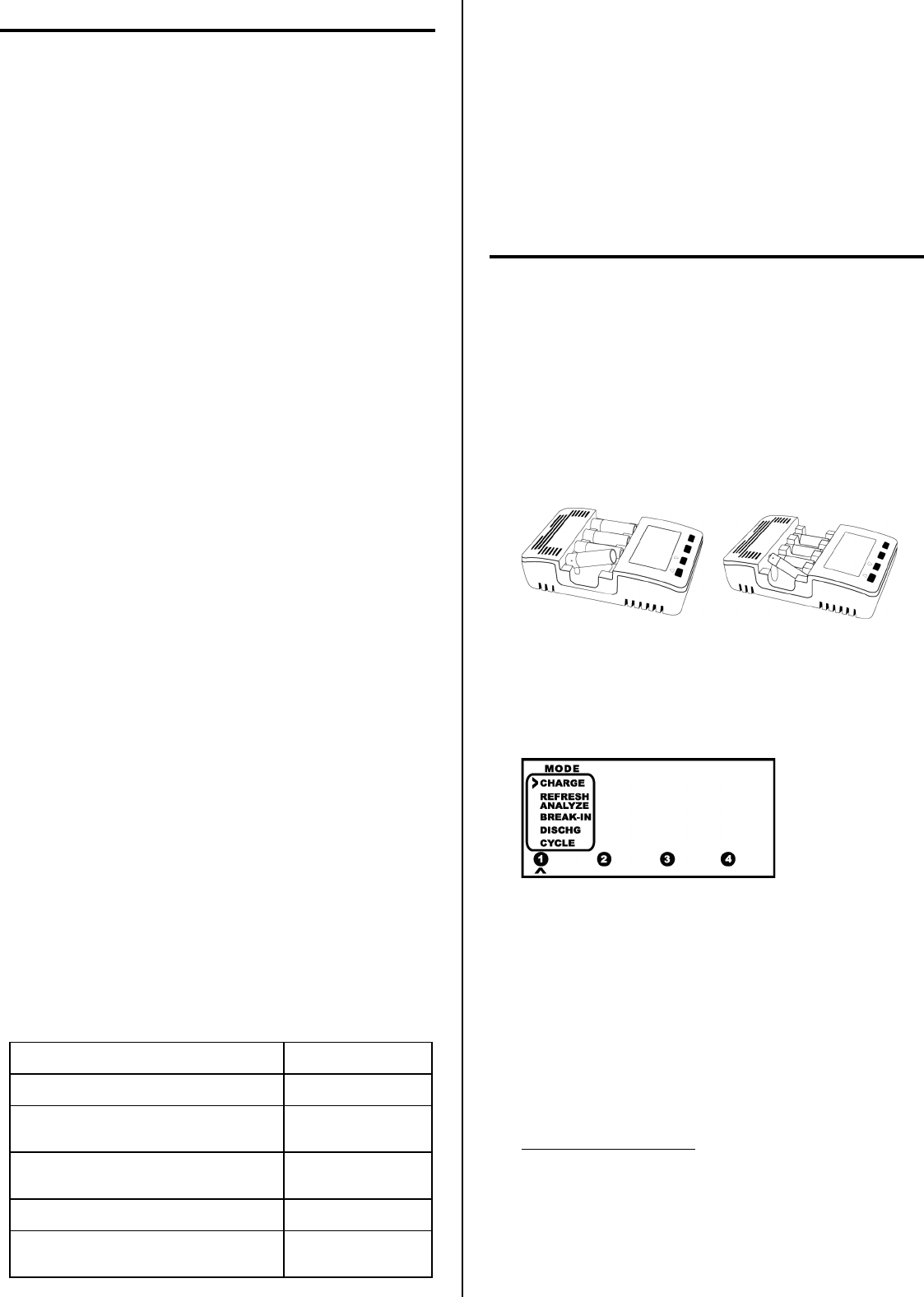
PRINTED IN TAIWAN A03-3713420-496
MODES OF OPERATION
This section explains various modes and when to use them. To enable
each mode, refer to the “Operation” section.
Charge Mode
• Recharges the battery at the selected rate.
• Useful when battery needs to be recharged without determining the
capacity of the battery. It should be used on batteries known to be in
good condition and have been in continuous use.
• Requires the least amount of time.
Refresh & Analyze Mode
• First recharges the battery, rest for one hour, discharge, rest, then
recharges again. Charging and discharging rates are programmable.
• Reports the discharge capacity at the end of the cycle.
• Useful when the battery capacity needs to be determined. Also
useful for battery with degraded performance.
• Recommended once every ten cycles for NiMH batteries.
Break-In Mode (IEC capacity analysis)
• Applies a 16-hour 0.1C charge (0.1 times the capacity of the
battery), rest of one hour, followed by a 0.2C discharge, rest again,
and finally a 16-hour 0.1C recharge again.
• Recommended for brand-new batteries. This process is also known
as “Forming Charge.” Also recommended with batteries that cannot
be rescued by the Refresh & Analyze mode.
• Recommended once every 30 cycles for NiMH batteries.
• Requires 39 to 45 hours to complete.
• The process follows the IEC standard for determining battery
capacity.
Discharge Mode
• Discharges the battery at the selected rate.
• Useful for analyzing the amount of charge stored in the battery.
Battery not recharged at the end of the cycle.
Cycle Mode
• Performs a charge-discharge cycle for the programmable number of
times. Charging and discharging rates are also selectable. At the
end of the cycle, a final recharge is applied.
• Suitable for cycling the batteries multiple times.
The following table summarized the recommended mode for typical
battery conditions:
Battery Condition
Mode
Brand-new batteries
Break-In
NiMH batteries that have been used
frequently (at least once every two weeks)
Charge
Batteries in storage for more than two
weeks but less than 3 month
Refresh & Analyze
Batteries in storage for more than 3 month
Break-In
Batteries showing poor performance
Refresh & Analyze for
one to three times.
Battery Rescue Steps
For batteries that do not perform favorably after using the mode
recommended above, the following sequence can be applied.
1. Refresh & Analyze for one to three times.
2. If capacity is still low, use Break-In mode.
3. If the step 1 to step 2 shows some capacity improvement (> 10%),
repeat Break-In mode for one to three times. If no significant
improvement, battery probably at end of useful life.
OPERATIONS
1. Connect the power adapter DC connector to the charger.
Then, plug the power adapter into a compatible outlet (100-240VAC,
50/60Hz).
TIP: When operating the charger outside of its intended region of
use, simply use a plug-changer (Maha part number MHS-TC400
worldwide plug-changer kit). Transformer is not necessary.
2. Raise the lift rod located on the backside of the charger.
3. Insert AA or AAA battery.
Inserting AA batteries Inserting AAA batteries
TIP: If charging two batteries, inserting them in the first and fourth
slot offers better cooling and lowers battery temperature.
4. When a new battery is detected, the LCD will display an arrow below
the bank number and prompt for the mode by flashing “MODE”.
Use the UP and DOWN arrow keys to choose the desired mode.
Press ENTER to make the selection.
If no key is pressed within five seconds, the charger will proceed to
the default mode which is charging with 1000mA rate.
NOTE: the default mode may not be suitable for battery lower than
500mAh and higher than 1500mAh. See “General Battery
Education” for more details.
If more than one battery is inserted at a time (without key press), the
charger will prompt for programming in the order in which the
batteries were inserted.
5. If CHARGE mode is selected:
The charger will prompt for the charging rate by flashing “SET CHG
RATE.” Use the UP and DOWN key to choose the desired current.
Press ENTER to make the selection. Refer to the “General Battery
Education” section on choosing an appropriate rate.






